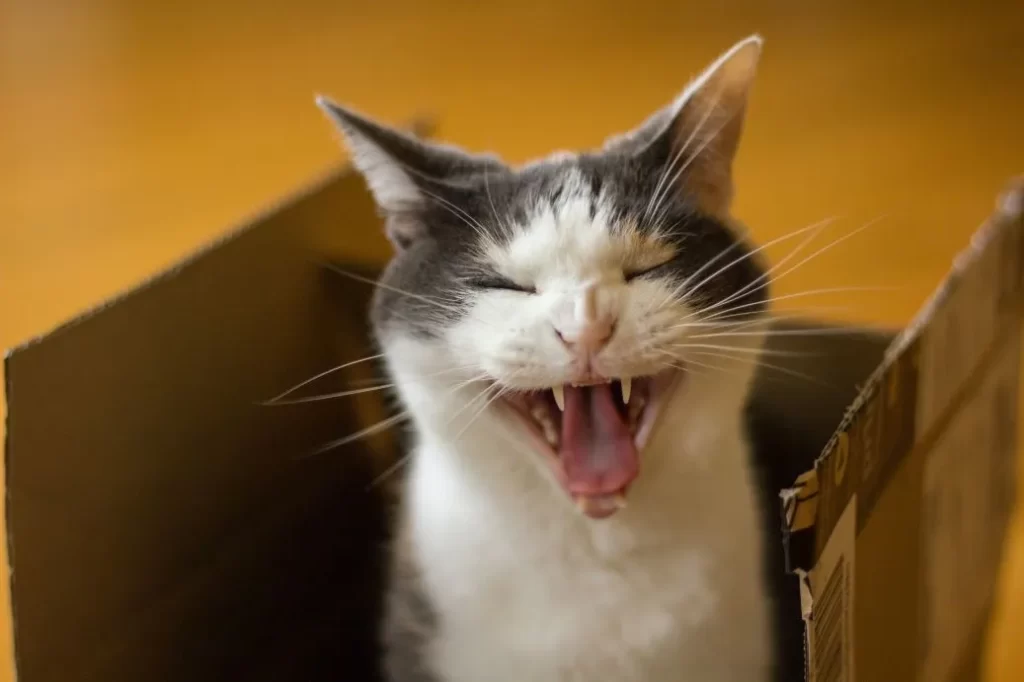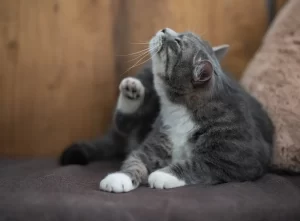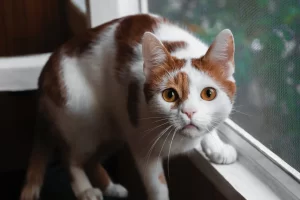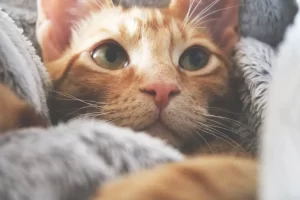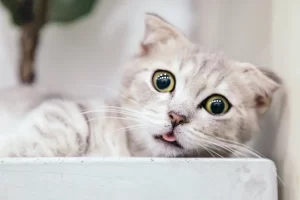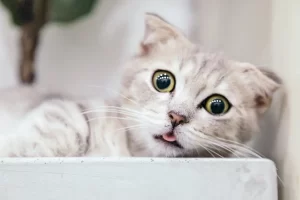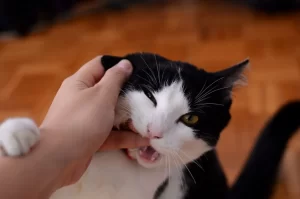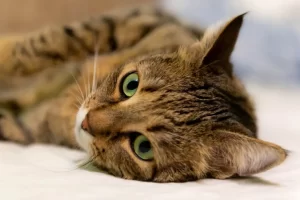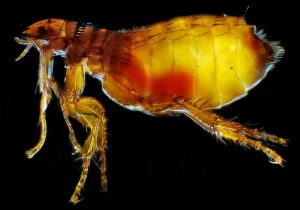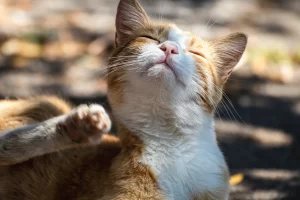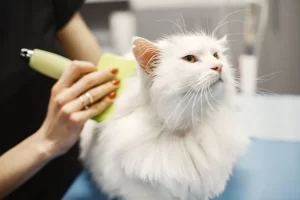Cat laryngitis is a common condition that affects the voice box and causes a cat to have a hoarse or raspy voice. This condition can be caused by a variety of factors, including infections, allergies, and even cancer. While some cases of laryngitis can be managed with home treatment, others may require veterinary intervention, including medications or surgery. In this article, we will cover the most important topics that should be discussed when discussing cat laryngitis home treatment, including causes, symptoms, treatments, and preventive measures. With proper care and attention, cats with laryngitis can make a full recovery and enjoy a healthy and happy life.
Table of Contents
ToggleWhat is cat laryngitis?
Cat laryngitis is an inflammation of the larynx (voice box) in cats. It can cause hoarseness or loss of voice, coughing, gagging, and difficulty breathing.
Gender does not appear to be a significant factor in the development of laryngitis in cats. However, certain breeds such as Siamese and Persian cats may be predisposed to laryngitis due to their unique anatomy.
Age can play a role in the development of laryngitis in cats. Younger cats and kittens may develop laryngitis as a result of respiratory infections, while older cats may develop laryngitis as a result of age-related changes in the larynx.
Causes of cat laryngitis
The causes of cat laryngitis can include:
- Respiratory infections (e.g. viral or bacterial)
- Allergic reactions (e.g. to dust, pollen, or smoke)
- Irritants (e.g. tobacco smoke, perfumes, cleaning products)
- Foreign objects (e.g. grass seeds, toys)
- Trauma (e.g. from rough play or collar injury)
- Tumors (e.g. cancerous or benign growths in the larynx)
- Acid reflux or gastroesophageal disease
- Age-related changes in the larynx
- Congenital conditions (e.g. abnormal laryngeal anatomy)
- Chronic bronchitis
- Fungal infections
- Parasites (e.g. heartworms)
- Hypothyroidism
- Environmental stress
- Genetics.
Note that some cats may have multiple underlying causes for their laryngitis. A veterinarian will be able to diagnose the specific cause of laryngitis and provide appropriate treatment.
Symptoms of cat laryngitis
The symptoms of cat laryngitis can include:
- Hoarseness or loss of voice – the cat may have a raspy or quiet meow or may be unable to make any vocal sounds at all.
- Coughing – this may be a dry or moist cough and can be accompanied by gagging or retching.
- Difficulty breathing – the cat may have rapid or shallow breathing, or may struggle to breathe normally.
- Open-mouth breathing – the cat may breathe with their mouth open due to difficulty breathing through their nose.
- Drooling – the cat may drool excessively due to discomfort or difficulty swallowing. If the only symptom is drooling, you might be able to treat it at home by following these simple cat drooling home remedies.
- Reduced appetite – the cat may not eat or drink due to pain or difficulty swallowing.
- Sneezing – the cat may sneeze frequently, especially if they have a respiratory infection (see also cat sneezing natural remedies).
- Nasal discharge – the cat may have a clear, yellow, or green discharge from their nose, especially if they have a respiratory infection.
- Increased panting – the cat may pant excessively, especially if they are having difficulty breathing.
- Lethargy – the cat may be less active or more tired than usual.
- Pain – the cat may show signs of pain or discomfort, such as crying out when they are touched or meowing more frequently.
Note that not all cats will show all of these symptoms, and the symptoms can vary in severity from case to case.
Medications and over-the-counter medicines for cat laryngitis
Medications that may be used for the treatment of cat laryngitis include:
Prescription medications:
- Antibiotics – for bacterial infections
- Corticosteroids – to reduce inflammation
- Bronchodilators – to open up the airways and make breathing easier
- Acid reducers – for acid reflux or gastroesophageal disease
- Immune modulators – to help manage allergic reactions
- Thyroid hormone supplementation – for hypothyroidism
Over-the-counter medications:
- Anti-histamines – for allergic reactions
- Mucolytic agents – to break up mucus
Cat laryngitis: Home treatment and remedies
Here are the main home remedies that can be used to help manage cat laryngitis, although it is important to note that these remedies should only be used in conjunction with veterinary care, and are not a substitute for veterinary treatment.
- Humidifier – Keeping the air moist can help soothe a cat’s inflamed larynx and make breathing easier.
- Steam therapy – Running a hot shower or using a humidifier can create a steamy environment that can help clear nasal and throat passages.
- Warm compress – Applying a warm compress to the throat can help reduce pain and inflammation.
- Herbal remedies – Certain herbs, such as chamomile, lavender, and echinacea, have anti-inflammatory and soothing properties that may help relieve laryngitis symptoms.
- A saltwater gargle – A saltwater gargle can help soothe a sore throat and reduce inflammation.
- Honey – Honey has antibacterial and anti-inflammatory properties that can help soothe a sore throat and boost the immune system.
- Vitamin C – Vitamin C has antioxidant properties that can help boost the immune system and reduce inflammation.
- Avoid irritants – Avoiding irritants, such as tobacco smoke and strong perfumes, can help reduce laryngitis symptoms.
- Gentle exercise – Gentle exercise, such as walking, can help clear mucus from the airways and improve breathing.
- Good nutrition – Feeding a balanced and nutritious diet can help boost the immune system and support overall health.
- Increased hydration – Encouraging the cat to drink more water can help soothe a sore throat and improve hydration.
- Cough suppressants – Cough suppressants can help reduce coughing, especially at night when the cat is trying to sleep.
- Essential oils – Certain essential oils, such as lavender and tea tree oil, have anti-inflammatory and antibacterial properties that may help reduce laryngitis symptoms.
- Homeopathic remedies – Certain homeopathic remedies, such as belladonna and aconite, can help reduce inflammation and relieve laryngitis symptoms.
- Acupuncture – Acupuncture can help reduce inflammation and relieve pain associated with laryngitis.
It is important to note that not all home remedies will be appropriate for every cat, and it is important to consult with a veterinarian before using any home remedy. Additionally, some remedies can have side effects and should be used with caution.
Herbal remedies for cat laryngitis
Here are 10 herbal remedies that can be used to help manage cat laryngitis, although it is important to note that these remedies should only be used in conjunction with veterinary care and are not a substitute for veterinary treatment.
- Chamomile – Chamomile has anti-inflammatory and soothing properties that can help reduce inflammation and relieve laryngitis symptoms. Chamomile can be made into tea and given to the cat to drink or used as a rinse for the throat.
- Lavender – Lavender has anti-inflammatory and calming properties that can help reduce inflammation and relieve laryngitis symptoms. A lavender essential oil can be added to a diffuser or added to the cat’s bedding to help create a calming environment.
- Echinacea – Echinacea has immune-boosting properties that can help support the immune system and reduce laryngitis symptoms. Echinacea can be made into tea and given to the cat to drink or added to their food.
- Licorice – Licorice has anti-inflammatory properties that can help reduce inflammation and relieve laryngitis symptoms. Licorice can be made into tea and given to the cat to drink.
- Ginger – Ginger has anti-inflammatory and antioxidant properties that can help reduce inflammation and relieve laryngitis symptoms. Ginger can be made into tea and given to the cat to drink or added to their food.
- Marshmallow – Marshmallow has anti-inflammatory properties that can help reduce inflammation and relieve laryngitis symptoms. Marshmallows can be made into tea and given to the cat to drink.
- Slippery elm – Slippery elm has soothing properties that can help relieve laryngitis symptoms. Slippery elm can be made into tea and given to the cat to drink or used as a rinse for the throat.
- Thyme – Thyme has antiseptic properties that can help reduce laryngitis symptoms caused by a bacterial infection. Thyme can be made into tea and given to the cat to drink or added to their food.
- Turmeric – Turmeric has anti-inflammatory properties that can help reduce inflammation and relieve laryngitis symptoms. Turmeric can be added to the cat’s food.
- Yarrow – Yarrow has anti-inflammatory and soothing properties that can help reduce inflammation and relieve laryngitis symptoms. Yarrow can be made into tea and given to the cat to drink.
proper diets, nutrition, and supplements for cat laryngitis
Here are proper diets, nutrition, and supplements that can help manage cat laryngitis:
Diets:
- Moist and soft diets – These diets can help soothe the throat and reduce inflammation. Examples include canned food and raw diets.
- Hydrating diets – Proper hydration is important for overall health and can help reduce laryngitis symptoms. Offer fresh water and moist diets to ensure adequate hydration.
- Limited-ingredient diets – Cats with food allergies or sensitivities can benefit from limited-ingredient diets that are made with fewer ingredients.
Nutrition:
- Omega-3 fatty acids – Omega-3 fatty acids have anti-inflammatory properties that can help reduce inflammation and relieve laryngitis symptoms. Examples include fish oil supplements and salmon.
- Antioxidants – Antioxidants can help reduce oxidative stress and support overall health. Examples include vitamins C and E, beta-carotene, and selenium.
- Probiotics – Probiotics can help support the gut and immune system, which can help reduce laryngitis symptoms. Examples include yogurt, kefir, and probiotic supplements.
Supplements:
- Vitamin B12 – Vitamin B12 can help support overall health and reduce laryngitis symptoms.
- L-Lysine – L-Lysine is an amino acid that has antiviral properties and can help reduce laryngitis symptoms caused by a viral infection.
- Glutamine – Glutamine is an amino acid that can help support the immune system and reduce laryngitis symptoms.
It is important to note that not all diets, nutrition, and supplements will be appropriate for every cat, and it is important to consult with a veterinarian before making any changes to a cat’s diet or supplement regimen.
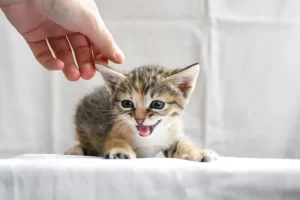
Avoiding triggers for cat laryngitis
Here are some triggers that can worsen cat laryngitis and should be avoided:
- Irritants – Exposure to irritants like cigarette smoke, cleaning products, and perfumes can worsen laryngitis symptoms.
- Allergens – Exposure to allergens like dust, pollen, and mold can trigger laryngitis symptoms.
- Environmental changes – Exposure to sudden temperature changes or humid environments can trigger laryngitis symptoms.
- Stress – Stress can weaken the immune system and trigger laryngitis symptoms.
- Loud noises – Loud noises can irritate the throat and trigger laryngitis symptoms.
- Upper respiratory infections – Upper respiratory infections can worsen laryngitis symptoms.
- Poor air quality – Exposure to poor air quality can irritate the throat and trigger laryngitis symptoms.
Identify and avoid any triggers that may worsen a cat’s laryngitis symptoms.
Maintaining good hygiene for cat laryngitis
Good hygiene is important in managing cat laryngitis and preventing its recurrence. Here are some tips for maintaining good hygiene for a cat with laryngitis:
- Keep the litter box clean – A dirty litter box can be a source of bacteria and viruses that can trigger laryngitis symptoms.
- Clean the living environment – Regularly clean the living environment to reduce exposure to irritants and allergens that can trigger laryngitis symptoms.
- Regular grooming – Regular grooming can help remove any irritants and allergens that may be present on a cat’s fur and skin.
- Keep the air clean – Use air purifiers to reduce exposure to irritants and allergens in the air.
- Regular veterinary visits – Regular veterinary visits can help ensure that a cat is healthy and free from infections that can trigger laryngitis symptoms.
Maintaining good hygiene is important for the overall health of a cat with laryngitis, and it can help reduce the severity and frequency of laryngitis symptoms.
Read More: How often do you take a cat to the vet?
Stress reduction for cat laryngitis
Reducing stress is important for managing cat laryngitis and preventing its recurrence. Here are some tips for reducing stress in a cat with laryngitis:
- Provide a safe and comfortable environment – Create a safe and comfortable environment for a cat to reduce stress levels.
- Regular exercise – Encourage regular exercise through playtime and interactive toys to reduce stress levels.
- Consistent routine – Maintain a consistent routine to reduce stress levels and provide stability for a cat.
- Calming pheromones – Use calming pheromones, such as plug-in diffusers or sprays, to help reduce stress levels.
- Reduced exposure to stressors – Reduce exposure to stressors, such as loud noises and unfamiliar visitors, to help reduce stress levels.
- Positive reinforcement training – Use positive reinforcement training to help a cat feel more confident and secure, reducing stress levels.
Reducing stress levels is important for the overall health of a cat with laryngitis, and it can help reduce the severity and frequency of laryngitis symptoms.
Possible complications of cat laryngitis
Cat laryngitis can lead to several possible complications, including:
- Chronic laryngitis – Prolonged or recurring laryngitis can result in chronic laryngitis, leading to long-term throat irritation and discomfort.
- Respiratory problems – Chronic laryngitis can cause respiratory problems, such as coughing and wheezing, making it harder for a cat to breathe.
- Increased risk of infections – Chronic laryngitis can weaken a cat’s immune system, making it more susceptible to infections.
- Voice changes – Chronic laryngitis can cause permanent voice changes, such as hoarseness or loss of voice.
Increased risk of anesthetic complications – Chronic laryngitis can increase the risk of complications during anesthesia, making it more difficult to undergo procedures.
Prevention of cat laryngitis
Here are some tips for preventing cat laryngitis:
- Maintain good hygiene – Regular grooming and cleaning of a cat’s face and mouth can help reduce the risk of laryngitis.
- Avoid irritants – Avoid exposing a cat to irritants, such as cigarette smoke, strong odors, and air pollution, to reduce the risk of laryngitis.
- Provide a healthy diet – A balanced and nutritious diet can help maintain a cat’s overall health and reduce the risk of laryngitis.
- Keep a clean environment – Maintaining a clean and dust-free environment can help reduce the risk of laryngitis.
- Reduce stress levels – Reducing stress levels through playtime, interactive toys, and positive reinforcement training can help prevent laryngitis.
- Seek prompt veterinary care – Early detection and treatment of underlying health conditions can help prevent laryngitis and reduce the risk of complications.
Which vet to visit with what specialties?
A general practitioner veterinarian is often the first point of contact for a cat with laryngitis, but in some cases, referral to a specialist may be necessary. Here are some veterinary specialists that may be involved in the care of a cat with laryngitis:
- Internal Medicine Specialist – This type of veterinarian specializes in diagnosing and treating diseases affecting the internal organs and systems, including the respiratory system.
- Ophthalmologist – This type of veterinarian specializes in diagnosing and treating eye conditions, including those that may affect the larynx.
- Dermatologist – This type of veterinarian specializes in diagnosing and treating skin conditions, including those that may affect the larynx.
- Oncologist – This type of veterinarian specializes in diagnosing and treating cancer, including tumors of the larynx.
- Cardiologist – This type of veterinarian specializes in diagnosing and treating heart conditions, including those that may affect the larynx.
Recovery and things to do after surgery
Here are some things to keep in mind for a cat’s recovery after laryngitis surgery:
- Follow veterinary instructions – Follow the veterinarian’s instructions for post-operative care, including medications, wound care, and restrictions on activity.
- Monitor for signs of complications – Watch for signs of complications, such as infection, bleeding, or difficulty breathing, and seek prompt veterinary care if any are observed.
- Provide a quiet and stress-free environment – Create a quiet and stress-free environment to allow the cat to rest and recover.
- Offer a soft diet – Offer a soft diet and encourage the cat to drink plenty of water to avoid dehydration and promote healing.
- Gradually increase activity – Gradually increase the cat’s activity level as directed by the veterinarian, taking care to avoid any activities that could put stress on the larynx.
- Avoid irritants – Avoid exposing the cat to irritants, such as cigarette smoke and strong odors, to reduce the risk of further irritation or inflammation.
- Follow up with the veterinarian – Follow up with the veterinarian as directed for monitoring and assessment of the cat’s progress.

